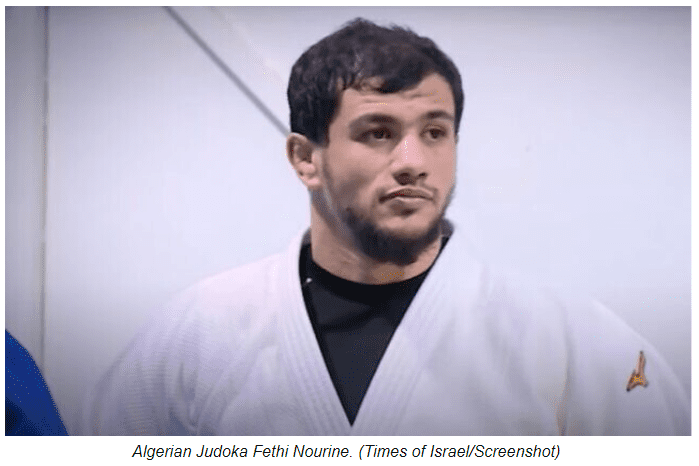Aside from reports of the first medals won and footage of the spectacular opening ceremony, one story from the Tokyo Olympics has attracted a lot of attention: the decision by Algerian judo athlete Fethi Nourine to withdraw from the games rather than face his Israeli competitor, Tohar Butbul. Nourine told Algerian TV that his support for the Palestinian cause had led him to withdraw. That may well be the case but it’s only fair to raise a number of points that need to be clarified before anyone should accept his stated motivation at face value.

- The first and most obvious one is the fact that Nourine had only slightly more than a snowball’s chance in hell of defeating Butbul. The Israeli is the 7th best in the world in his under 73kg category and is a real medal contender. Nourine ranks as 31st and realistically had little prospect of defeating his Israeli opponent.
- However – without performing an exhaustive analysis of Nourine’s competition history – we must assume that he doesn’t often withdraw from taking on opponents if he has little chance of winning. After all, the Iranians have found to their cost that judo’s international governing body doesn’t take kindly to athletes being choosy about whom they compete against. Also, it’s unlikely that Nourine often withdraws from bouts involving opponents from countries whose politics he disapproves of as there are few countries who can claim to have an exemplary record. Levels of anti-Jewish feeling in Algeria are extraordinarily high with nearly 90% of people being rated as antisemitic. Considering the well-documented contempt in Arab societies towards Jews (e.g. that they’re the sons of apes and pigs who have historically occupied a far inferior position to Muslims), is it possible that it was the shame of possibly losing to a(n Israeli) Jewish guy that led to his decision?
- Over the years, there has been a number of instances of anti-Israel gestures by either individual athletes or athletic authorities from Muslim majority countries such as the United Arab Emirates, Egypt, Malaysia, Tunisia, Iran, and now, of course, Algeria. Notwithstanding the signing of the recent Abraham Accords, there’s no doubt that a lot of people from Muslim majority states still take grave exception to any interaction with Israelis in the sporting sphere. Yet strangely, this doesn’t seem to extend to China whose well-documented persecution of the Uighur Muslims of Xinjiang Province has attracted little interest in the Islamic world. Indeed, Algeria was one of the countries who signed a letter defending the persecution! What does Nourine have to say about that?
- Did Nourine choose freely to withdraw or was he forced to by his team? There is the case of Iranian judoka Saeid Mollaei who was ordered by his team to lose a match so that he would not have to meet an Israeli opponent in the following round of an international competition.
- Following on from points 3 and 4, there is still a lot of not just sporting but also official hostility amongst Muslim majority states across north Africa, the Middle East and south Asia towards Israel. In the specific case of Algeria, a blogger was sentenced to 10 years in prison simply for interviewing a spokesperson for the Israeli foreign affairs ministry. Could Nourine’s decision have been due to fears of the reaction of the regime rather than a personal choice?
- Let’s ignore all the above points and assume that Nourine’s decision was based on a sincere concern for the welfare of Palestinians whom he perceives – however incorrectly – to be oppressed by Israel. If that is the case, then presumably he would also be concerned about oppressed communities in his own country. What has he had to say about the ongoing marginalisation of the Amazigh (also known as “Berber”) community in Algeria? There seems to be no record of his ever having made any comment about their plight. If that is the case, then why?
Only Fethi Nourine can clarify the above points. Until he does that, it’s hard to avoid the conclusion that regardless of his stated reason for withdrawal from the bout with his Israeli opponent, the decision was motivated by some degree of ignorance and/or insincerity.
By Ciarán Ó Raghallaigh




